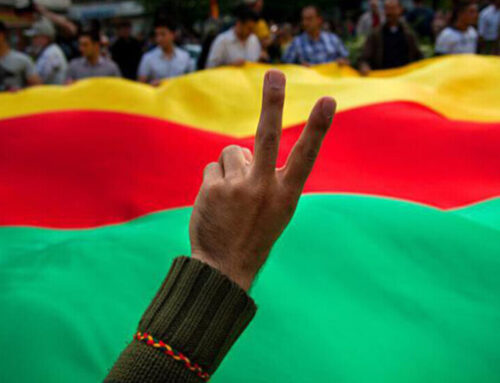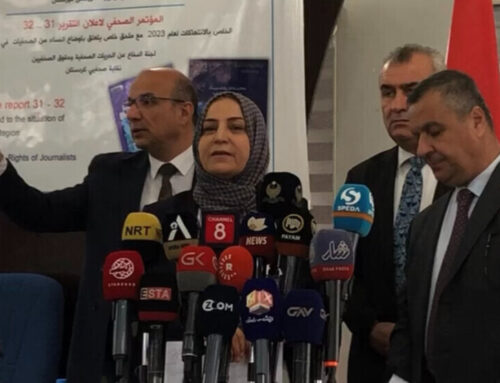Syrian Kurds hunt down Islamic State jihadists after prison attack
Syrian Kurds hunt down Islamic State jihadists after prison attack
- Date: January 24, 2022
- Categories:Rights

- Date: January 24, 2022
- Categories:Rights
Syrian Kurds hunt down Islamic State jihadists after prison attack
Kurdish forces in Syrian Kurdistan (Rojava), northeastern Syria, on Friday hunted down Islamic State group fighters after an IS attack on a Kurdish-run prison housing fellow jihadists, a war monitor and Kurdish forces said.
The rare attack on Gweran (Ghwayran) prison in Hasaka province on Thursday saw the jihadists detonate a car bomb near the jail and attack Kurdish forces guarding the facility in an attempt to free some of the group’s members, the Kurdish-led Syrian Democratic Forces said.
The Syrian Observatory for Human Rights monitor said “five IS prisoners managed to break out”, but it remains unclear whether they have since been killed or recaptured.
The US-led coalition battling IS said “SDF casualties ensued during the attack”, but it did not disclose how many.
The assault triggered clashes between the jihadists and US-backed SDF forces around the prison that continued into Friday amid heightened security measures, the Observatory said.
“Clashes are ongoing between IS fighters and (Kurdish) military forces in the area,” Observatory director Rami Abdel Rahman told AFP, describing it as one of the largest such attacks by IS since its proto-state was declared defeated in 2019.
Syrian Kurdish forces capture ISIS members escaped Gweran prison in Hasaka
Kurdish special units of the Syrian Democratic Forces SDF captured two Islamic State ISIS members tried to escape from the Gweran prison in the city of Hasaka, Syrian Kurdistan (Rojava), Kanuary 21, 2022. Photo: ANHA
“At least six IS fighters have been killed in the clashes,” Abdel Rahman said, without specifying casualties among Kurdish security forces.
The SDF, which oversees the jail, said on Friday that it “arrested two IS fighters that tried to escape from the Gweran prison” as part of combing operations following the attack.
The jihadists were captured in the vicinity of the jail, it said.
It said IS fighters that carried out the attack were hiding in civilian homes in the neighbourhood of Al-Zuhoor near the jail.
“Exceptional security measures in the vicinity of the prison and surrounding neighbourhoods are ongoing,” it said in a statement on Friday morning.
IS fighters “are using civilians in the Al-Zuhoor neighbourhood and areas north of the prison as human shields,” it said, adding that IS had killed some civilians in the area.
“Our forces and the relevant security services are moving with great precision and sensitivity to contain these incident.”
‘Existential threat’
Gweran is one of the largest facilities housing IS fighters in a semi-autonomous Kurdish region controlled by Kurdish authorities in northeast Syria.
According to Kurdish authorities, more than 50 nationalities are represented in a number of Kurdish-run prisons where more than 12,000 IS suspects are now held.
From France to Tunisia, many of the IS prisoners’ countries of origins have been reluctant to repatriate them, fearing a public backlash at home.
IS “remains an existential threat in Syria and cannot be allowed to regenerate,” the coalition said in a statement after Thursday’s attack.
Syrian Kurds hunt down Islamic State jihadists after prison attack
Islamic State militants sit on the floor in Gweran prison in Hasaka, Syrian Kurdistan (Rojava), October 26, 2019. Photo: AFP
“Coalition forces will continue to defend against and deter hostile activities against ourselves and our partners.”
The IS group’s self-declared caliphate, established from 2014, once stretched across vast parts of Syria and Iraq and administered millions of inhabitants.
A long and deadly military fightback led by Syrian and Iraqi forces with backing from the United States and other powers eventually defeated the jihadist proto-state in March 2019.
The remnants of IS mostly went back to their desert hideouts from which they continue to attack Syrian government and allied forces.
Earlier this month, IS fighters shot dead an aid worker with the Kurdish Red Crescent at the Al-Hol camp for displaced people.
Last week, an IS attack near Syria’s border with Iraq killed five Syrian pro-regime fighters and wounded 14 others, according to the Observatory.
The worldwide-respected PYD-led Autonomous Administration in Syrian Kurdistan has a secular decentralized self-rule, where equality between men and women, direct democracy, and environmental responsibility are emphasized.
In 2013, the Syrian Kurdish Democratic Union Party PYD — the political branch of the Kurdish People’s Protection Units (YPG) — has established three autonomous Cantons of Jazeera, Kobani and Afrin and a Kurdish government across Syrian Kurdistan in 2013. On March 17, 2016, Kurdish and Arab authorities announced the creation of a “federal region” made up of those semi-autonomous regions in Syrian Kurdistan. Turkey on January 20, 2018 launched an operation against the YPG in the Kurdish canton of Afrin and on March 18, the Turkish troops supporting Syrian Islamic mercenary fighters drove the YPG out of Afrin city.
The Kurdish Democratic Union Party PYD and its powerful military wing YPG/YPJ, considered the most effective fighting force against IS in Syria and U.S. has provided them with arms. The YPG, which is the backbone of the Syrian Democratic Forces SDF forces, has seized swathes of Syria from Islamic State.
The Kurdish forces expelled the Islamic State from its last patch of territory in the eastern Syrian village of Baghouz in March 2019.
Over 11,000 Kurdish male and female fighters had been killed in five years of war to eliminate the Islamic State “caliphate” that once covered an area the size of Great Britain in Syria and Iraq.








Leave A Comment